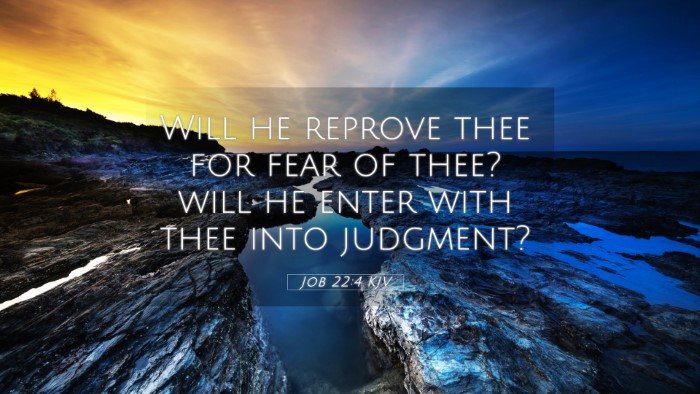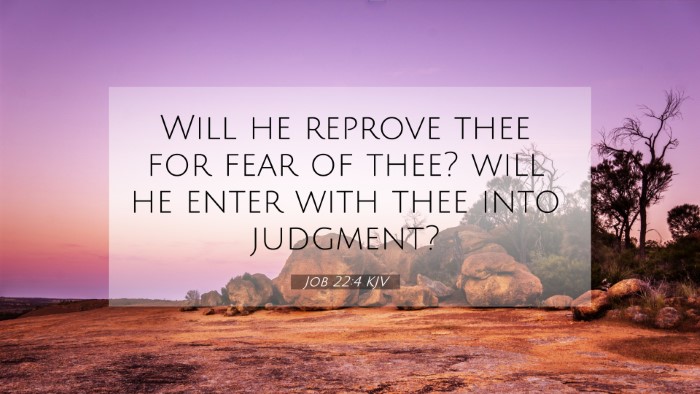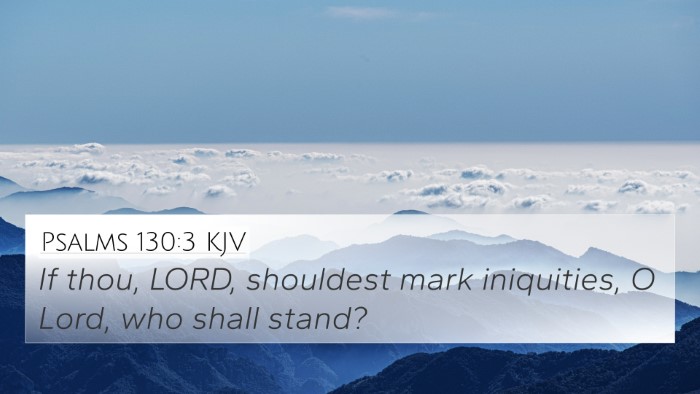Old Testament
Genesis Exodus Leviticus Numbers Deuteronomy Joshua Judges Ruth 1 Samuel 2 Samuel 1 Kings 2 Kings 1 Chronicles 2 Chronicles Ezra Nehemiah Esther Job Psalms Proverbs Ecclesiastes Song of Solomon Isaiah Jeremiah Lamentations Ezekiel Daniel Hosea Joel Amos Obadiah Jonah Micah Nahum Habakkuk Zephaniah Haggai Zechariah MalachiJob 22:4 Similar Verses
Job 22:4 Cross References
Will he reprove thee for fear of thee? will he enter with thee into judgment?
Uncover the Rich Themes and Topics of This Bible Verse
Listed below are the Bible themes associated with Job 22:4. We invite you to explore each theme to gain deeper insights into the Scriptures.
Job 22:4 Cross Reference Verses
This section features a detailed cross-reference designed to enrich your understanding of the Scriptures. Below, you will find carefully selected verses that echo the themes and teachings related to Job 22:4 KJV. Click on any image to explore detailed analyses of related Bible verses and uncover deeper theological insights.
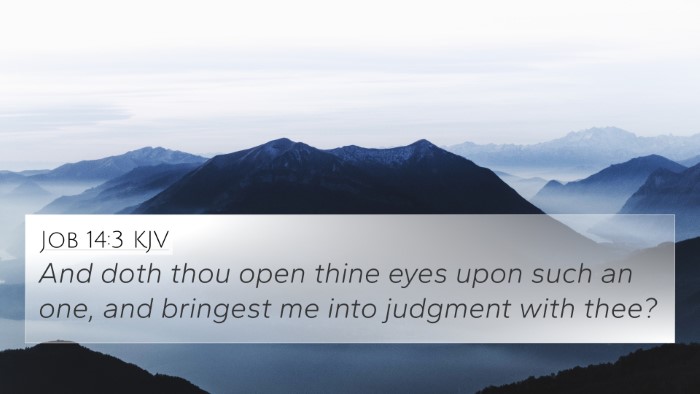
Job 14:3 (KJV) »
And doth thou open thine eyes upon such an one, and bringest me into judgment with thee?
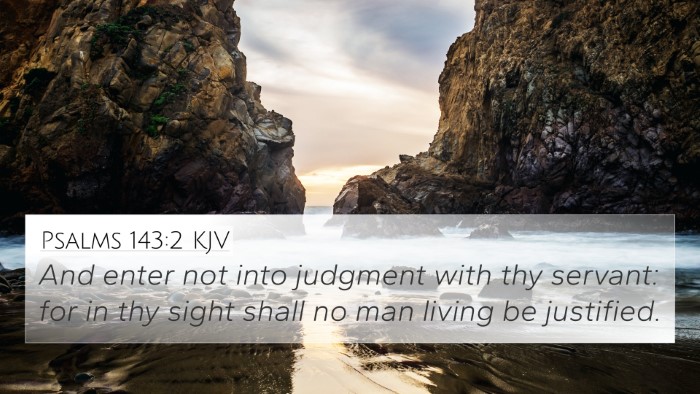
Psalms 143:2 (KJV) »
And enter not into judgment with thy servant: for in thy sight shall no man living be justified.
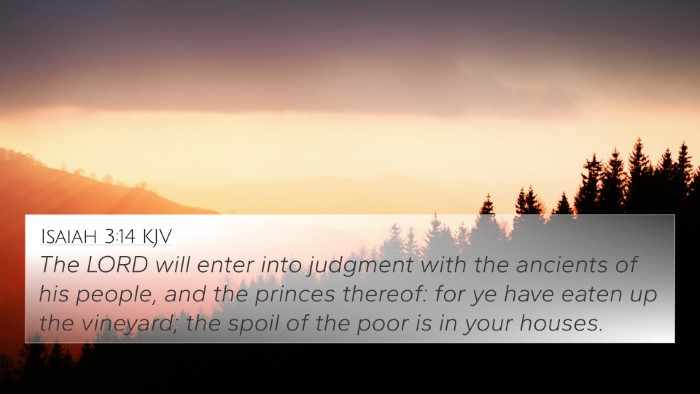
Isaiah 3:14 (KJV) »
The LORD will enter into judgment with the ancients of his people, and the princes thereof: for ye have eaten up the vineyard; the spoil of the poor is in your houses.

Ecclesiastes 12:14 (KJV) »
For God shall bring every work into judgment, with every secret thing, whether it be good, or whether it be evil.

Psalms 76:6 (KJV) »
At thy rebuke, O God of Jacob, both the chariot and horse are cast into a dead sleep.
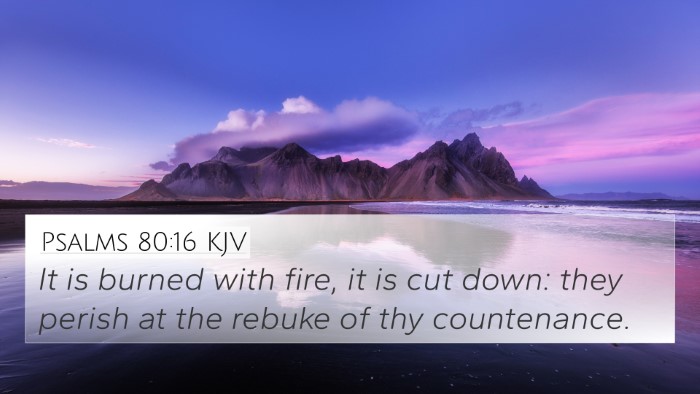
Psalms 80:16 (KJV) »
It is burned with fire, it is cut down: they perish at the rebuke of thy countenance.

Psalms 39:11 (KJV) »
When thou with rebukes dost correct man for iniquity, thou makest his beauty to consume away like a moth: surely every man is vanity. Selah.

Job 23:6 (KJV) »
Will he plead against me with his great power? No; but he would put strength in me.
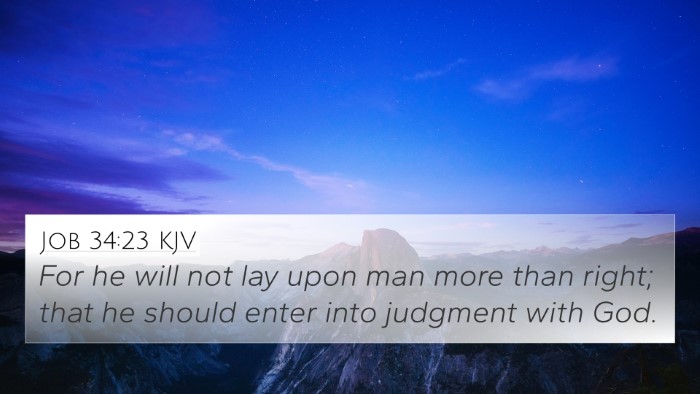
Job 34:23 (KJV) »
For he will not lay upon man more than right; that he should enter into judgment with God.
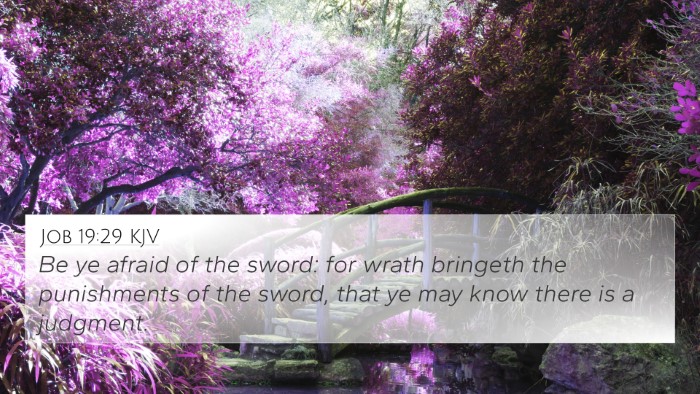
Job 19:29 (KJV) »
Be ye afraid of the sword: for wrath bringeth the punishments of the sword, that ye may know there is a judgment.

Job 9:32 (KJV) »
For he is not a man, as I am, that I should answer him, and we should come together in judgment.

Job 9:19 (KJV) »
If I speak of strength, lo, he is strong: and if of judgment, who shall set me a time to plead?
Job 22:4 Verse Analysis and Similar Verses
Understanding Job 22:4
Job 22:4 states, "Is it for your fear of him that he reproves you, and enters into judgment with you?" This verse is part of Eliphaz's speech, where he seeks to explain the suffering that Job is enduring. In this overview, we will explore the interpretations and meanings derived from various public domain commentaries.
Context and Background
The Book of Job is a profound exploration of suffering, justice, and the human relationship with God. Job, a blameless and upright man, faces intense trials that raise fundamental questions about divine justice.
Insights from Commentaries
-
Matthew Henry:
Henry emphasizes that Eliphaz suggests Job's suffering might be due to a lack of reverent fear of God. He interprets this as indicative of how suffering can prompt deeper self-reflection and lead to a rekindling of one’s relationship with God.
-
Albert Barnes:
Barnes focuses on the rhetorical aspect of the question posed in this verse. It implies a challenge to Job's fidelity and highlights the misconception of merit-based suffering and reward, suggesting that Job's suffering is not because of his righteousness, but rather a lack of fear towards God's potential judgment.
-
Adam Clarke:
Clarke offers a view on divine judgment, discussing how God uses reproach as a means of correction. He indicates that the fear of God should ideally lead to repentance and a return to righteousness, rather than despair.
Key Themes
- Divine Judgment: The verse explores the concept of God as a judge who scrutinizes the hearts of men.
- Human Suffering: Job's plight questions the nature of suffering and its correlation to one's character.
- Relationship with God: It invites believers to reflect on their relationship with God, especially during trials.
Cross-Referencing Bible Verses
Job 22:4 can be connected to several other Scripture passages that provide deeper insight into its themes:
- Job 1:22: Job did not curse God despite his suffering, reflecting his righteousness.
- Psalm 13:1: "How long, O Lord? Will you forget me forever?" - A query into divine judgment and silence.
- Proverbs 3:11-12: "Do not despise the Lord's discipline…" - Emphasizing the corrective nature of God’s judgments.
- Isaiah 57:15: The holiness of God in relation to the humble and contrite heart.
- Jeremiah 10:24: "O Lord, correct me, but with justice…" - A plea for understanding suffering through the lens of divine justice.
- Romans 8:28: All things work together for good for those who are called according to His purpose, connecting to ideas of divine intent behind human suffering.
- Hebrews 12:6: "For the Lord disciplines the one he loves…" - Relating to God’s corrective love as implied in Job’s suffering.
- 2 Corinthians 12:9: God’s grace is sufficient in times of weakness, reinforcing themes of strength in suffering.
- 1 Peter 4:12: Do not be surprised at the fiery ordeal you are about to suffer, sanctifying the process of trials.
- James 1:2-4: Consider it pure joy when you face trials of many kinds… - A New Testament perspective on suffering.
Tools for Further Study
Exploring Job 22:4 can be enriched through various study tools:
- Bible Concordance: Use a concordance to find related verses quickly.
- Bible Cross-Reference Guide: A guide assists in navigating thematic connections across Scriptures.
- Cross-Reference Bible Study: Methods for studying Scriptures in parallel can offer greater insights.
- Comprehensive Bible Cross-Reference Materials: Resources available for in-depth study of biblical texts.
Conclusion
Job 22:4 serves as a poignant reminder of the complex nature of suffering, divine judgment, and our relationship with God. Through various commentaries, we garner insights into the theological implications of this verse, while cross-referencing other scriptures provides valuable context and support. Such engagements with the text can deepen one’s understanding and facilitate a stronger connection to the Bible's overarching themes.

